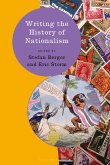Exploring the major historiographical, theoretical, and methodological approaches that have shaped studies on slavery, this addition to the Writing History series highlights the varied ways that historians have approached the fluid and complex systems of human bondage, domination, and exploitation that have developed in societies across the world. The first part examines more recent attempts to place slavery in a global context, touching on contexts such as religion, empire, and capitalism. In its second part, the book looks closely at the key themes and methods that emerge as historians reckon with the dynamics of historical slavery. These range from politics, economics and quantitative analyses, to race and gender, to pyschohistory, history from below, and many more. Throughout, examples of slavery and its impact are considered across time and place: in Ancient Greece and Rome, Medieval Europe, colonial Asia, Africa, and the Americas, and trades throughout the Atlantic and Indian Oceans. Also taken into account are thinkers from Antiquity to the 20th century and the impact their ideas have had on the subject and the debates that follow. This book is essential reading for students and scholars at all levels who are interested in not only the history of slavery but in how that history has come to be written and how its debates have been framed across civilizations.
Hinweis: Dieser Artikel kann nur an eine deutsche Lieferadresse ausgeliefert werden.
Hinweis: Dieser Artikel kann nur an eine deutsche Lieferadresse ausgeliefert werden.








